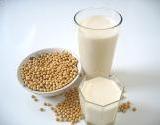Main Menu
Soy Causes Cancer?
Does soy cause cancer?
There's been some evidence that the estrogens in soy can cause, or feed already existing, cancers. Soy contains high levels of compounds called phytoestrogens. These compounds occur in other foods, too, such as flaxseed, dates, peanuts and green beans. According to one food survey, flaxseed has almost four times as much phytoestrogen as soybeans per 100 grams. Soybeans have three times as much of the compound as tofu per 100g, and 33 times as much as 100g of soymilk.
After the discovery that hormone replacement therapy could potentially increase the risk of breast cancer because of its estrogen-stimulating effect, doctors became wary of allowing cancer patients to consume anything with estrogen-boosting properties. Many treatments for breast cancer include some sort of estrogen-blocking method, such as hormonal therapies like estrogen receptor blockers and aromatase inhibitors. Consuming too much high-phytoestrogen food can actually block the effects of these drugs, which is why doctors often advise those with breast cancer to stop eating soy.
If you don't have cancer, though, doctors say consuming moderate amounts of soy is very good for you. It can cut your risk of heart disease and osteoporosis. There are even studies indicating that a high-phytoestrogen diet can prevent certain kinds of cancer: this is based on the low instance of breast, endometrial and prostate cancer in Asia, where soy intake is high. The key to moderation, doctors say, is to get your soy through foods, and stay away from dietary supplements touting themselves as being high in phytoestrogens. These supplements could promote the risk of cancer.
This information is solely for informational and educational purposes only. The publication of this information does not constitute the practice of medicine, family planning, child psychology, marriage counseling and this information does not replace the advice of your physician or other health care or mental health care provider. Neither the owners or employees of NaturalFamilyOnline.com or the author(s) of site content take responsibility for any possible consequences from any treatment, procedure, exercise, dietary modification, application of medication or any other action involving the care of yourself or any family members which results from reading this site. It is always best to speak with your primary health care provider before engaging in any form of self treatment. Additional information contained in our Legal Statement


